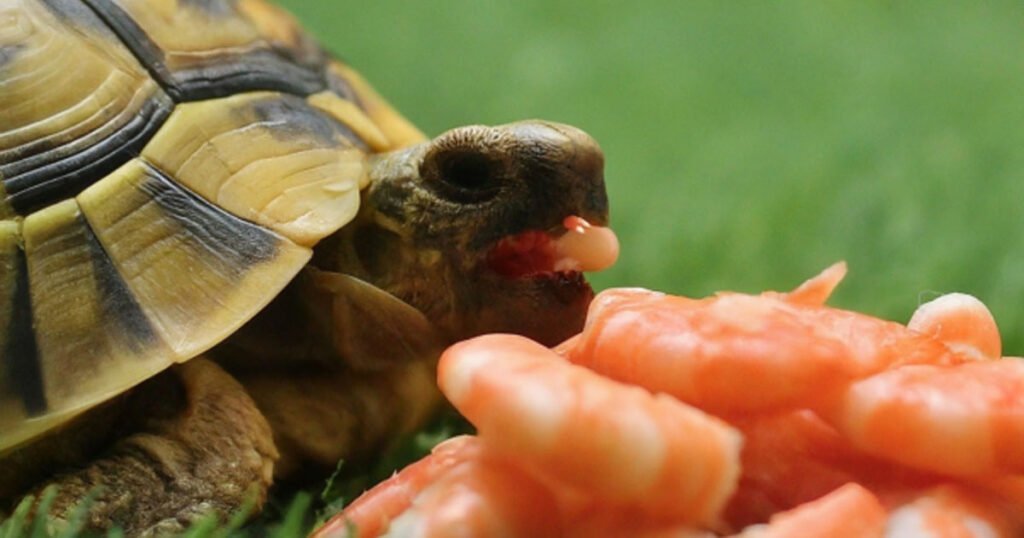Are you a new turtle owner? Looking for the answer to your turtle’s diet query”Can turtles eat shrimp?” Turtles, being omnivores, benefit from a varied diet that includes both animal protein and plants. To make sure your turtle gets the best nutrition, you have to make sure it gets a well-rounded diet.
Shrimp, known for its rich protein content, is a delicious and nutritious option for your aquatic pet. In this article, we’ll dive into the question “Can turtles eat shrimp?” And explore the benefits, considerations, and safe ways to introduce this aquatic delight to your turtle’s diet.
Whether you’re pondering on offering live raw shrimp, dried shrimp, or cooked shrimp, you will get all the answers here. Let’s find out the secrets of making shrimp a delightful addition to your turtle’s menu!
Table of Contents
Can Turtles Eat Shrimp?

Yes, turtles can eat shrimp, providing a tasty and nutritious addition to their diet. Turtles can safely consume shrimp as they contain no toxins. So, shrimp can be considered a safe food for turtles. Turtles enjoy all kinds of shrimp varieties. Shrimp provide a rich source of nutrients for turtles, offering healthy fats and varying textures. It can be a delightful and nutritious treat, contributing to their overall well-being.
However, balance is crucial, as shrimp should only be a small part of their overall diet. Consider the type and preparation of shrimp to ensure your turtle receives the best nutritional benefits from this aquatic snack. Shrimp should make up around 10 to 25% of the turtle’s weekly diet.
What Nutritions Turtle Can Get From Shrimp
Shrimp is not only a protein source but also offers essential nutrients for turtle health.
Omega-3 Fatty Acids for Vitality: Beyond protein, shrimp provide omega-3 fatty acids, contributing to hormone regulation, blood clotting, and inflammation reduction.
Calcium- Building Blocks for the Shell and Bones: Rich in calcium, shrimp supports strong shells and bones, and ensures proper muscle and nerve function.
Vitamins A and D -Boost Turtle Well-being: Shrimp contain vitamins A and D, essential for various bodily functions, from immune support to healthy tissues.
Micronutrients Galore
Explore the diverse array of micronutrients in shrimp:
Phosphorus: Cell growth, repair, and maintenance rely heavily on Phosphorus. So, it is crucial to ensure that this component is always present in the required amounts.
Copper: Copper is an essential mineral that helps to strengthen turtles’ immune systems and nerves. It also aids in the formation of collagen, which is essential for maintaining healthy skin, bones, and connective tissues.
Zinc: Zinc is essential for turtles as it facilitates DNA creation, helps with tissue repair, and boosts the immune system, ensuring turtles’ resilience.
Magnesium: Magnesium is vital for turtles as it supports muscle and nerve function. This nutrition helps control blood pressure and maintain balanced blood sugar levels.
Selenium: Selenium acts as a protective shield for turtles, safeguarding them against infections and DNA damage, and promoting their overall health and longevity.
Potassium and Sodium: The body needs to regulate its cellular fluid balance to support muscle contraction and maintain healthy blood pressure levels. In turtle bodies, potassium, and sodium contribute to this process.
Iron: Iron is essential for turtles as it promotes hemoglobin production, ensuring efficient oxygen transport throughout turtle bodies.
Manganese: Manganese supports a turtle’s bone health. It also helps to regulate sex hormones and aids in calcium absorption
Can Turtles Eat Frozen Shrimp?

Yes, turtles can indeed enjoy the chilly taste of frozen shrimp, adding a convenient and nutrient-rich option to their diet. Frozen shrimp preserves essential nutrients when feeding your shelled companion while providing a delightful treat. Turtles can get sick from bacteria in frozen shrimp, so making sure they’re fresh is essential.
To prepare this aquatic delight for your turtle, simply heat the frozen shrimp to a manageable temperature. Once defrosted, cut them into bite-sized portions to ensure easy consumption. If the size is small you can serve it whole. This not only enhances the feeding experience for your turtle but also ensures they receive the necessary nutrients locked within the frozen goodness.
Can Turtle Eat Live Shrimp?
You can give your turtle live shrimp at mealtime, as it is a thrilling experience full of nutrition. In addition to appealing to your turtle’s instincts, live elements deliver essential nutrients that are crucial for their health.
Live shrimp, like ghost shrimp, trigger your turtle’s predatory behaviors. It also provides protein and other nutrients. While your turtle enjoys the chase, the live shrimp contribute to a diverse diet, ensuring they receive a comprehensive range of nutrients necessary for optimal health.
Can Turtles Eat Cooked Shrimp?

Turtles can eat cooked shrimp and it is safe as a delightful addition to their diet. As shrimp provide protein boosts along with essential vitamins. However, it’s crucial to approach this tasty treat with caution due to the potential risks associated with bacteria.
While cooked shrimp can be a safe and enjoyable treat, you should collect formalin-free or fresh quality shrimp. Don’t make cooked shrimp your turtle’s main meal, and be careful about potential contamination.
Feed cooked shrimp in small, controlled portions to prevent overconsumption and maintain a balanced and healthy diet for your aquatic companion.
Can Turtles Eat Raw Shrimp?
Yes, turtles can have the delightful taste and texture of raw shrimp, and they prefer it. To ensure raw shrimp freshness and safety, keep it frozen until you’re ready to offer it to your turtle. Place it in the fridge for a few hours before serving, and consider cutting larger pieces into suitable chunks for easy consumption.
While turtles often enjoy raw shrimp, it’s essential to vary their diet. Raw shrimp can constitute up to 25% of their overall food intake, adding taste and nutrition to their diets. Shrimp should be added to their meal as a supplement, not the main food.
Can Turtle Eat Shrimp Formula (Pellet)?
Formulated Shrimp grains (pellets), originally made for other aquatic companions, can be a treat for turtles. Although turtles love the crunchy texture, these pellets don’t contain all the nutrients for their daily diet. Consider them a seasonal addition, providing a delightful break from their regular menu.
Is There Any Drawbacks Of Shrimp For Turtles Health?
While turtles enjoy shrimp, too much can disturb their digestive balance, potentially leading to issues. Juvenile turtles, in particular, may struggle with the richness of shrimp. A well-balanced diet is crucial, making shrimp an occasional, not daily, indulgence to ensure your turtle’s overall health.
FAQ
Can Box Turtles Eat Shrimp?
Shrimp is a tasty treat for box turtles. You can add shrimp to their diet to give them variety. Protein and other essential nutrients make shrimp a wholesome snack for your box turtle. It’s important to give it in the right proportion, as with any treat. If you want your box turtle to be healthy and happy, you should keep their diet balanced and varied.
Can Turtles Eat Brine Shrimp?
Yes, turtles can eat the brine shrimp, whether they’re frozen or in any other form. However, it’s essential to consider a few factors to ensure your aquatic friend’s well-being. The size of the shrimp, the frequency of feeding, and the balance of their diet all matter. While brine shrimp can be a delightful addition, too much or a regular meal can be harmful.
Read More: Can Turtles Eat Apples
Bottom Line
So, can turtles eat shrimp? Absolutely! From frozen delights to live shrimp, these aquatic reptiles relish shrimp-filled feasts. But, as with any food adventure, keeping it moderate is key. Shrimp delights turtle palates, but remember, a well-rounded diet ensures their health. Treat your shelled friends to a shrimp sensation, keeping munching in check for a happy and healthy aquatic companion.
